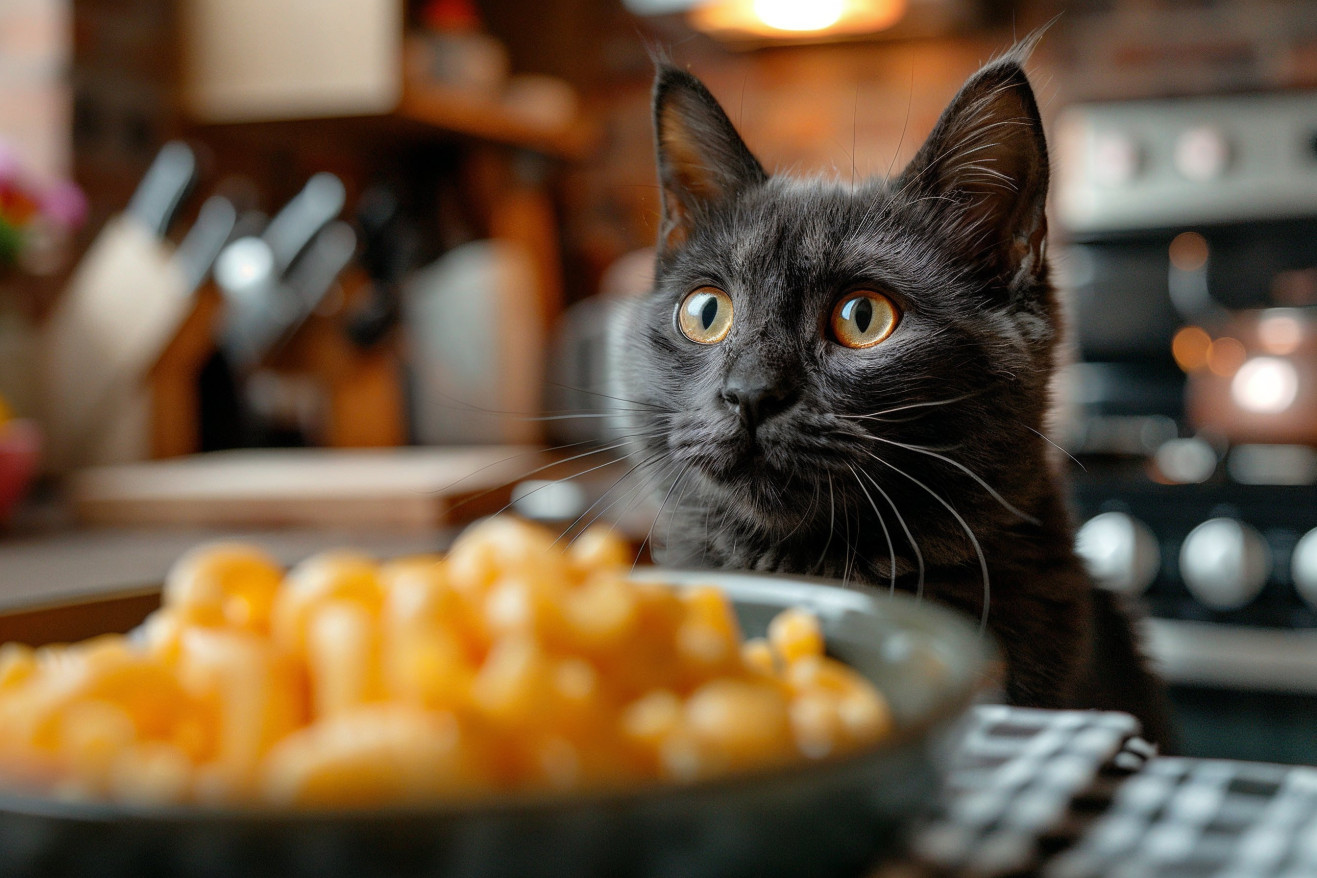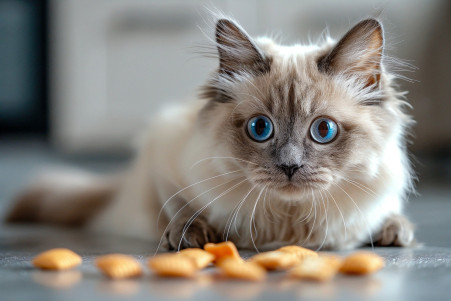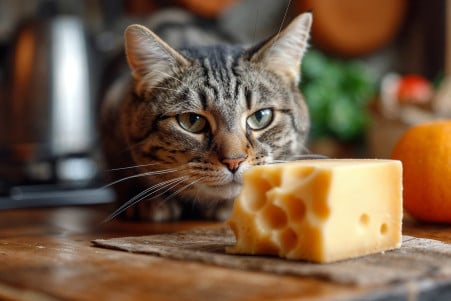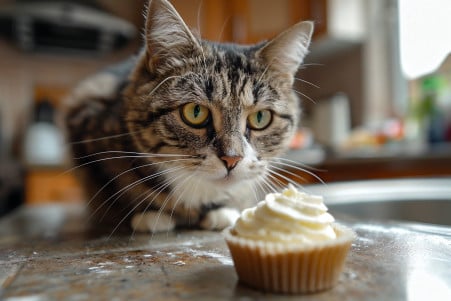Can Cats Have Mac and Cheese? Here's What a Vet Says
20 April 2024 • Updated 18 April 2024

Cats are obligate carnivores, but that doesn't mean you haven't wondered whether the dairy and carbs in mac and cheese are safe for your furry friend. Mac and cheese is safe for cats to eat in small amounts as an occasional treat. However, the high fat, salt, dairy, and carbs in mac and cheese can lead to digestive issues, obesity, and other health problems if cats eat it regularly.
While many pet experts discourage cat owners from sharing their food with their pets, we'll discuss information from veterinarians and scientific research to determine whether mac and cheese is healthy for cats. We'll also talk about the potential pros and cons and share some tips for safely giving your cat a taste of this delicious dish without harming them in the long run.
Can cats eat mac and cheese?
Nutritional Needs and Risks for Cats
As obligate carnivores, cats need a diet that is high in animal protein and low in carbohydrates, per Catster. Pasta and grains are not nutritionally beneficial for cats and can contribute to weight gain, per this article from Untamed.
Most cats are also lactose intolerant and lack the enzyme lactase, which is needed to digest lactose in dairy products like cheese, per Hastings Veterinary Hospital. The high fat, salt, and dairy content of mac and cheese can lead to vomiting, diarrhea, and other gastrointestinal issues. While some cats may tolerate small amounts of hard cheese, according to James Wellbeloved, soft cheeses and cow's milk are more likely to cause digestive problems.
Because of this, cats should not eat human foods like mac and cheese on a regular basis. Cats are carnivores and require a diet that is high in animal protein, and straying from this diet can lead to health and digestive issues.
Special Occasions and Portion Control
Although it's not the best option for cats, some cats may be able to enjoy a small amount of plain mac and cheese as a special treat, according to All About Pets. However, it's important to practice portion control and limit the amount of mac and cheese to a few bites per week to prevent stomach issues and weight gain, as recommended by Vets Now. In general, no more than 10% of a cat's daily caloric intake should come from treats, including mac and cheese, to ensure that they're getting the nutrition they need from their regular diet.
Make sure to avoid giving cats mac and cheese that contains any ingredients that could be harmful to them, such as onions, garlic, or high levels of salt, as these can be toxic, according to PetMD. Also, keep an eye on cats after giving them treats and stop giving them mac and cheese if they experience any digestive issues.
Healthier Snack Options for Cats
Cat treats made for cats are the best option since they are made with a cat's dietary needs in mind, says the Smyrna Animal Hospital. Cats can also eat plain, cooked chicken or fish to get a different protein in their diet. Small amounts of plain, low-fat yogurt may be OK for cats that aren't lactose intolerant, according to PetMD. Catnip, cat grass, and other cat-safe herbs can be used to add variety and enrichment to a cat's diet.
As with any new food, it's important to introduce these items slowly and in moderation to make sure your cat doesn't have any adverse reactions, says Catster. It's best to stay away from human snacks that are highly processed, salty, or sugary for your cat's health.
More Human Foods That Cats Should Not Eat
In addition to butter, many other human food items are toxic to cats, including onions, garlic, and chocolate, per Catster. In general, cats should not eat highly processed, salty, or sugary foods because they don't offer any nutritional value.
In addition, fatty foods like butter can cause pancreatitis in cats if they are consumed in excess, according to Modern Vet. Cheese crackers and similar snacks are often made with dairy, salt, and other ingredients that cats can't eat.
In general, it's best to feed your cat a nutritionally balanced, commercial cat food that has been approved by veterinarians. As The Wildest notes, cats have very specific dietary requirements that human food can't meet. A vet can help you make sure that your cat is getting the nutrients they need to stay healthy in the long run.
Conclusion: Cats Should Stick to a Balanced Diet
While it's technically okay for cats to eat a small amount of plain mac and cheese as a treat, it's probably best to avoid it. The high fat, salt, dairy, and carbs in mac and cheese can lead to digestive upset, weight gain, and other health issues in cats if they eat it regularly.
Cats are obligate carnivores, which means they need a diet that's high in animal protein and low in carbs. Catster notes that pasta and grains don't offer much nutrition for cats and can lead to weight gain. Plus, many cats are lactose intolerant and can't properly digest the lactose in dairy products like cheese, according to Hastings Veterinary Hospital. The high fat, salt, and dairy content of mac and cheese can lead to vomiting, diarrhea, and other digestive problems.
As a result, All About Pets says that while a small amount of plain mac and cheese might be okay for some cats as an occasional treat, it should be fed in moderation. Cats should get no more than 10% of their daily calories from treats like this to ensure they maintain a balanced diet, according to Vets Now.
It's also important to make sure that any mac and cheese given to cats doesn't contain ingredients like onions, garlic, or high levels of salt, which can be toxic, according to PetMD. Healthier treat options for cats include commercial cat treats, plain cooked meats, and cat-safe herbs and greens.
Overindulging cats with human foods can lead to obesity, digestive distress, and other health issues. It's best to consult with a veterinarian before introducing new foods into a cat's diet. With the right nutrition and the occasional approved treat, cats can live long, healthy lives.


